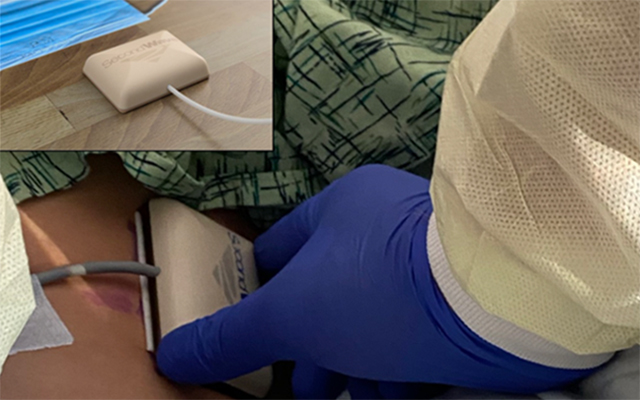Using Ultrasound Stimulation to Reduce Inflammation in COVID-19 In-Patients
By Doug Ramsey
San Diego, CA, , May 12, 2021 — Researchers at University of California San Diego School of Medicine have begun a pilot clinical trial to test the efficacy of using ultrasound to stimulate the spleen and reduce COVID-19-related inflammation, decreasing the length of hospital stays.

“It’s a pilot study to evaluate whether ultrasound stimulation focused on the spleen can reduce inflammatory biomarkers in hospital patients infected with SARS-CoV-2,” said Imanuel Lerman, MD, associate professor of anesthesiology at UC San Diego School of Medicine and an affiliate of Qualcomm Institute at UC San Diego, where his lab is based. “This will allow us to determine whether treating patients this way can really affect clinical outcomes in COVID-19 infections.”
The two- to three-month study, called Ultrasound Neural and Immunomodulation Treatment Evaluation Study for COVID-19 or UNITE Study, will recruit 40 patients with severe COVID-19 symptoms, all admitted to Jacobs Medical Center at UC San Diego Health. Half of the patients in the trial will be given ultrasound treatment daily for up to seven days, in addition to receiving anti-inflammatory drugs, such as remdesivir and dexamethasone, which are currently part of standard medical care. The other half – the control group – will receive only standard medical care.

“We will be watching to see how quickly the ultrasound patients can be discharged from the hospital compared to the control group,” said Lerman. “While we are planning to do the ultrasound treatments up to seven days, we’re hoping that ultrasound stimulation of the spleen can get them home even sooner and also prevent patients from experiencing more severe symptoms while in the hospital.”
In earlier rodent studies, stimulating the spleen with a non-invasive ultrasound device was shown to reduce inflammation. Researchers have also demonstrated the anti-inflammatory value of spleen stimulation in healthy human subjects and in human patients with rheumatoid arthritis (RA).
Both RA and COVID-19 patients can suffer from a hyperinflammatory response driven by over-production of cytokines—proteins that signal and spur an inflammatory immune response. The resulting “cytokine storm” in COVID-19 patients can lead to acute respiratory distress syndrome, known as ARDS, which can be fatal.
In a July 2020 study on medRXiv, an online site that posts papers that have not yet undergone peer review, General Electric Research and University of Minnesota scientists described the effects of splenic stimulation in RA and healthy patients, and its potential in COVID-19 patients:
“Non-invasive ultrasound activation of the splenic neuroimmune pathway may provide an alternative method to combat the cytokine storm without compromising the adaptive immune response in COVID-19 patients, ultimately reducing the high mortality and morbidity rates confronting this worldwide pandemic that currently has limited treatment options.”
Prior studies have also shown that electrical stimulation of the vagus nerve, which runs from the brain to the gut, using a cervical implant, reduces inflammation. Stimulating the spleen may activate the same anti-inflammatory pathways.
The clinical trial will use an investigational device developed by SecondWave Systems. Strategically placed on patients’ skin, the device generates low-intensity, focused ultrasound waves targeting the spleen. Treatment occurs daily for approximately 18 minutes for up to seven days.
The UNITE study is funded through an award from the U.S. Department of Defense’s Joint Program Executive Office for Chemical, Biological, Radiological and Nuclear Defense in collaboration with the Defense Health Agency and SecondWave Systems, Inc.
In addition to Dr. Lerman, the UNITE team includes MD candidates Omar Sahial and Jeremy Sieker, MS candidate Elizabeth Baum, research associate Marielys Padilla-Martinez, Phirum Nguyen, RN, and BS candidates Sopyda Yin, Rhea Gandhi, Noamon Sahial and Yosef Faiq. Team members assist Lerman in screening study patients, conducting informed consent, collecting data and performing patient interviews.
Dr. Lerman is also leading a team with support from the Qualcomm Institute to develop a miniaturized Vagus Sentinel-Magnetometer (VS-M). The low-profile wearable would provide continuous monitoring of vagus-nerve firing. The goal of this project is to detect pathogen-specific, localized infections before symptoms of a bad infection emerge. The project was funded by the U.S. Department of Health and Human Services’ (HHS) Biomedical Advanced Research and Development Authority (BARDA) in 2019.
“We are also doing work with BARDA to record the inflammatory signals that may be evident in COVID-19 infection,” added Lerman.
For more information on the clinical trial, visit ClinicalTrials.gov at https://clinicaltrials.gov/ct2/show/NCT04803409?term=201611&draw=2&rank=2
Media Contacts
Doug Ramsey, 858-822-5825, dramsey@ucsd.edu
Scott LaFee, 858-249-0456, slafee@health.ucsd.edu
Related Links
Lerman Lab
Calming the Cytokine Storm - Splenic Ultrasound for Treating Inflammatory Disorders and Potentially COVID-19

